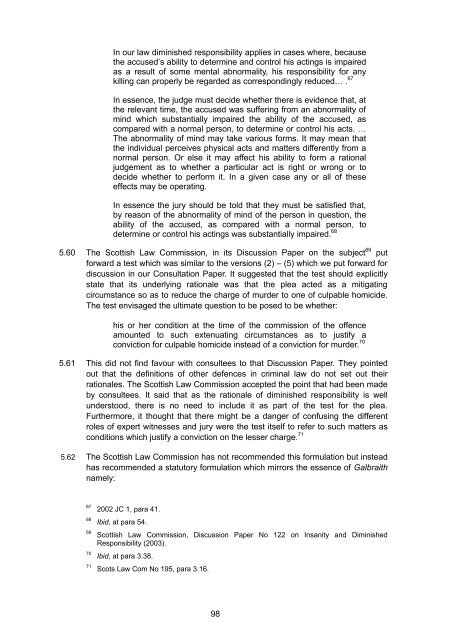lc290 Partial Defences to Murder report - Law Commission
lc290 Partial Defences to Murder report - Law Commission
lc290 Partial Defences to Murder report - Law Commission
Create successful ePaper yourself
Turn your PDF publications into a flip-book with our unique Google optimized e-Paper software.
In our law diminished responsibility applies in cases where, because<br />
the accused’s ability <strong>to</strong> determine and control his actings is impaired<br />
as a result of some mental abnormality, his responsibility for any<br />
killing can properly be regarded as correspondingly reduced… . 67<br />
In essence, the judge must decide whether there is evidence that, at<br />
the relevant time, the accused was suffering from an abnormality of<br />
mind which substantially impaired the ability of the accused, as<br />
compared with a normal person, <strong>to</strong> determine or control his acts. …<br />
The abnormality of mind may take various forms. It may mean that<br />
the individual perceives physical acts and matters differently from a<br />
normal person. Or else it may affect his ability <strong>to</strong> form a rational<br />
judgement as <strong>to</strong> whether a particular act is right or wrong or <strong>to</strong><br />
decide whether <strong>to</strong> perform it. In a given case any or all of these<br />
effects may be operating.<br />
In essence the jury should be <strong>to</strong>ld that they must be satisfied that,<br />
by reason of the abnormality of mind of the person in question, the<br />
ability of the accused, as compared with a normal person, <strong>to</strong><br />
determine or control his actings was substantially impaired. 68<br />
5.60 The Scottish <strong>Law</strong> <strong>Commission</strong>, in its Discussion Paper on the subject 69 put<br />
forward a test which was similar <strong>to</strong> the versions (2) – (5) which we put forward for<br />
discussion in our Consultation Paper. It suggested that the test should explicitly<br />
state that its underlying rationale was that the plea acted as a mitigating<br />
circumstance so as <strong>to</strong> reduce the charge of murder <strong>to</strong> one of culpable homicide.<br />
The test envisaged the ultimate question <strong>to</strong> be posed <strong>to</strong> be whether:<br />
his or her condition at the time of the commission of the offence<br />
amounted <strong>to</strong> such extenuating circumstances as <strong>to</strong> justify a<br />
conviction for culpable homicide instead of a conviction for murder. 70<br />
5.61 This did not find favour with consultees <strong>to</strong> that Discussion Paper. They pointed<br />
out that the definitions of other defences in criminal law do not set out their<br />
rationales. The Scottish <strong>Law</strong> <strong>Commission</strong> accepted the point that had been made<br />
by consultees. It said that as the rationale of diminished responsibility is well<br />
unders<strong>to</strong>od, there is no need <strong>to</strong> include it as part of the test for the plea.<br />
Furthermore, it thought that there might be a danger of confusing the different<br />
roles of expert witnesses and jury were the test itself <strong>to</strong> refer <strong>to</strong> such matters as<br />
conditions which justify a conviction on the lesser charge. 71<br />
5.62 The Scottish <strong>Law</strong> <strong>Commission</strong> has not recommended this formulation but instead<br />
has recommended a statu<strong>to</strong>ry formulation which mirrors the essence of Galbraith<br />
namely:<br />
67 2002 JC 1, para 41.<br />
68 Ibid, at para 54.<br />
69 Scottish <strong>Law</strong> <strong>Commission</strong>, Discussion Paper No 122 on Insanity and Diminished<br />
Responsibility (2003).<br />
70 Ibid, at para 3.38.<br />
71 Scots <strong>Law</strong> Com No 195, para 3.16.<br />
98

















